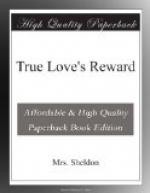“You are very proud-spirited,” he remarked; then, with a sly smile, “but as for the name you affect to so despise, it would be an easy matter to change it.”
Mona colored at this observation, not because she gave a thought to his meaning, but because she hoped it would not be so very long before she would change the hated name of Montague for the honored one of Palmer.
Her companion noticed the flush, and an eager look flashed into his eyes, while his lips trembled with the torrent of burning words which he longed to pour into her ears. But he controlled himself for the moment, and continued:
“You ask me if I will give you the tangible proof of your mother’s marriage. I have told you that I can do so; that I know the whole story of the elopement and the desertion. I can produce absolute proof that Mona Forester was a legal wife.”
“Then give it to me—give it to me and I will believe that you are my friend,” Mona cried, appealingly, and trembling with excitement at his statement.
“I will do so gladly,” the young man said, a smile of triumph curling his lips, “but I can only do so conditionally.”
“Conditionally?” repeated Mona, her great eyes flashing up to his face with a startled look.
“Yes. I can produce the certificate proving your father’s and mother’s honorable marriage. I can give you letters that will also prove it, and prove, too, that your father was not quite so disreputable and heartless as you have been led to believe. There is also a picture of him, painted on ivory, and set in a frame of gold, embellished with costly stones, which he had made for his wife, and there are valuable jewels and other keepsakes which he bestowed upon her with lavish hands, and which now rightly belong to you. All these I will give you if—if you will marry me—if you will be my wife, Mona.”
The girl sprang to her feet, every atom of color now gone from her face, and confronted him with haughty mien.
“Your wife!” she began, pantingly. But he would not let her go on—he meant at least to explain himself more fully before allowing her to reject him.
“Yes, why not?” he asked, throwing into his tone all the tenderness he could command, “for I love you, Mona, with all my heart. I have told you so once before, but you would not believe me. You taunted me with unworthy motives, and asserted that I would not dare to confess my affection to my aunt; but I have confessed it, and she is willing that I should win you. I know that I have paid devoted attention to Kitty McKenzie, as you also twitted me of doing, and Aunt Margie wanted me to marry her; but when she found that I had no love to give her, that my heart was set upon you, she yielded the point, and I now have her full and free consent to make you my wife. Do not scorn my suit, Mona; I cannot think of you as Ruth Richards any longer; do not curl your proud lips and flash your glorious eyes upon




